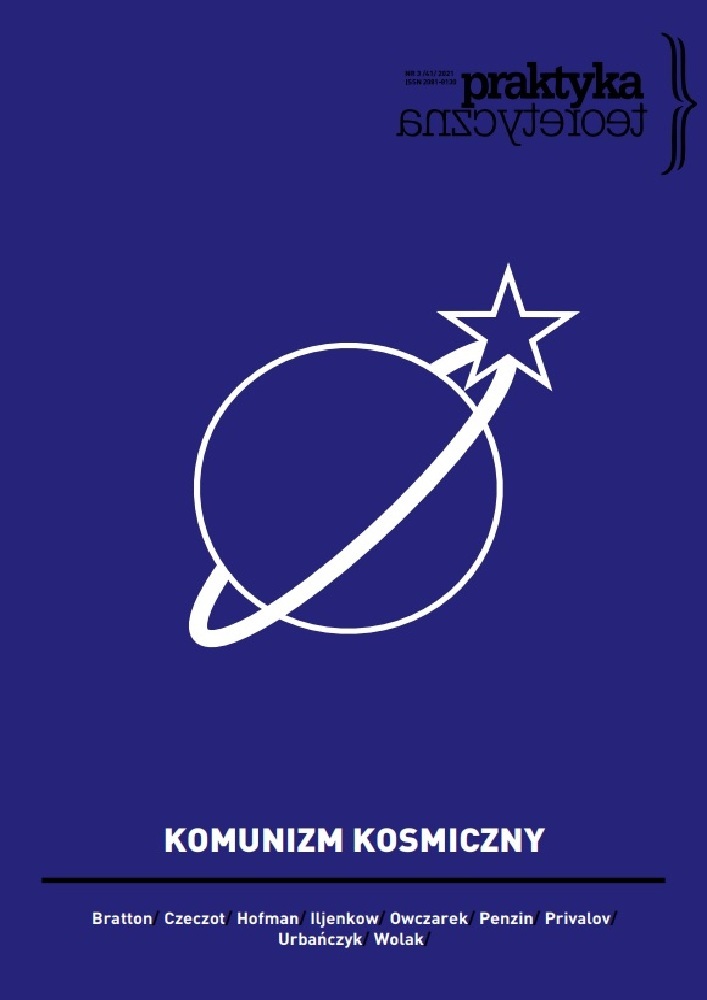Abstract
The starting point of this paper is the transformation of the notion of influence, which as late as in the seventeenth century was defined as acting of celestial bodies upon the Earth, and only in the nineteenth century did it take on its present, more general meaning. I sketch this transformation against the background of other processes characteristic of modernity. One of them is the eradication of astrology from the field of science, linked to the triumph of dualistic philosophy and the birth of industrial capitalism, which together objectified and commodified nature. The second of these processes is the career that the concept of influence begins to make in the nineteenth century, becoming one of the most important categories not only of the natural sciences but also of the social sciences, where, understood more as spiritual power, it allows to describe the action of ideas on society and of intellectuals on government. The third one – the birth of the modern subject with its characteristic „influence anxiety“. These contexts, outlined in the article, allow us to see modernity in a new light – as a civilization in which influence that of the environment might exert on humans is unambiguously classified as a threat. They also allow us to ask the question to what extent may the modern redefinition of the relationship between man and the cosmos held responsible for the ecological crisis.
References
Académie française Auteur du. 1694. Le dictionnaire de l’Académie françoise. T. 1, A-L. Paris: Jean Baptiste Guignard. https://gallica.bnf.fr/ark:/12148/bpt6k503971.
Jean Baptiste Guignard. 1762. Dictionnaire de l’Académie françoise. T. 1. Paris: Bernard Brunet. https://gallica.bnf.fr/ark:/12148/bpt6k504034.
Académie française Auteur du texte. 1835. Dictionnaire de l’Académie française. T. 1. Paris: Firmin Didot. https://gallica.bnf.fr/ark:/12148/bpt6k50407h.
Arystoteles. 2003a. Fizyka. Dzieła wszystkie. T. 2. Tłum. Kazimierz Leśniak. Warszawa: PWN.
Arystoteles. 2003b. „O powstawaniu i niszczeniu.” W Dzieła wszystkie. Tłum. Kazimierz Leśniak. T. 2. Warszawa: PWN.
Bacon, Francis. 1857. „De augmentis scientiarum.” W The Work of Francis Bacon. T. 1, red. James Spedding i in. London: Longmans.
Bloom, Harold. 2002. Lęk przed wpływem. Teoria poezji. Tłum. Marcin Szuster. Kraków: Universitas.
Chittka, Lars. 2020. „The Secret Lives of Bees as Horticulturists?” Science 368(6493): 824–825. https://doi.org/10.1126/science.abc2451.
Diaz, José-Luis. 1997. „Un siècle sous influence.” Romantisme 27(98): 11–32. https://doi.org/10.3406/roman.1997.4286.
Foucault, Michel. 1998. Trzeba bronić społeczeństwa. Wykłady w Collège de France, 1976. Tłum. Małgorzata Kowalska. Warszawa: KR.
Geddes, Linda. 2019. W pogoni za słońcem. O świetle słonecznym i jego wpływie na ciało i umysł. Tłum. Andrzej Wojtasik. Kraków: Insignis.
Gilbert, Sandra M., i Susan Gubar. 2000. The Madwoman in the Attic: The Woman Writer and the Nineteenth-Century Literary Imagination. New Haven: Yale University Press.
Hegel, Georg Wilhelm Friedrich. 1958. Wykłady z filozofii dziejów. T. 1. Tłum. Adam Landman. Warszawa: PWN.
Hunt, Lynn. 1992. The Family Romance of the French Revolution. Berkeley: University of California Press.
Koselleck, Reinhart. 2009. „Rewolucja jako pojęcie i jako metafora. O semantyce niegdyś górnolotnego pojęcia.” W Dzieje pojęć. Studia z semantyki i pragmatyki języka społeczno-politycznego. Tłum. Wojciech Kunicki i Jarosław Merecki. Warszawa: Oficyna Naukowa.
Linde, Samuel Bogumił. 1854a. Słownik języka polskiego. T. II, G-L. Lwów: Wydawnictwo Zakładu Narodowego im. Ossolińskich. http://archive.org/details/sownikjzykapolsk02linduoft.
Linde, Samuel Bogumił. 1854b. Słownik języka polskiego. T. VI, U-Z. Lwów: Wydawnictwo Zakładu Narodowego im. Ossolińskich. http://archive.org/details/sownikjzykapolsk06linduoft.
Maupassant, Guy de. 1961. Horla i inne opowiadania. Tłum. Irena Wieczorkiewicz. Warszawa: Czytelnik.
Menuret, Jean-Joseph. 1766. L’Encyclopédie, 1re éd. Paris: Briasson, David l’aîné, Le Breton, Durand.
Pashalidou, Foteini, Harriet Lambert, Thomas Peybernes, Mark Mescher, i Consuelo De Moraes. 2020. „Bumble bees damage plant leaves and accelerate flower production when pollen is scarce.” Science 368 (maj): 881–884. https://doi.org/10.1126/science.aay0496.
Ptolemaeus, Claudius. 2012. Czworoksiąg/Tetrábiblos. Tłum. Grzegorz Muszyński. Wrocław: Wydawnictwo Uniwersytetu Wrocławskiego.
Schmitt, Carl. 2012. Teologia polityczna i inne pisma. Warszawa: Wydawnictwo Aletheia.
Trotz, Michał Abraham. 1764. Nowy dykcyonarz to iest Mownik polsko-niemiecko-francuski... Leipzig: Johann Friedrich Gleditsch.
License
“Theoretical Practice” seeks to put into practice the idea of open access to knowledge and broadening the domain of the commons. It serves the development of science, thinking and critical reflection. The journal is published in open-access mode under the CC-BY-NC-SA 4.0 license (detail available here: http://creativecommons.org/licenses/by-nc-sa/4.0/). Articles published in the journal may be freely distributed, stored, printed and utilized for academic and teaching purposes without restrictions.
They should not be, however, used for any commercial purposes or be reconstructed into derivative creations. Access to the journal may not be limited or offered for a fee by any third party.
Prospective authors are obliged to fill in, sign and send back the publishing contract compliant with the CC licencing. [PL.pdf, PL.doc, EN.pdf,EN.doc].
According to this contract, authors grant the journal a non-exclusive right to publish their work under the creative commons license (CC-BY-NC-SA 4.0) without any financial obligation on both sides of the contract.
Before submission authors should make sure that derivative materials they use are not protected by copyright preventing their non-commercial publication. Authors are responsible for any respective copyright violations.
